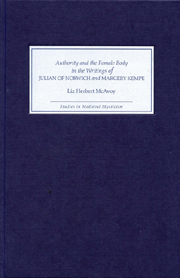Book contents
- Frontmatter
- Contents
- Dedication
- Acknowledgements
- Abbreviations
- Introduction
- 1 Motherhood and Margery Kempe
- 2 The Motherhood Matrix in the Writing of Julian of Norwich
- 3 Discourses of Prostitution and The Book of Margery Kempe
- 4 ‘3yf thowe be payede,’ quod oure lorde, ‘I am payede’: Hermeneutics of the Holy Whore in Julian of Norwich
- 5 Margery Kempe: Wisdom, Authority and the Female Utterance
- 6 Julian of Norwich: Voice of the Wise Woman
- Afterword
- Bibliography
- Index
1 - Motherhood and Margery Kempe
Published online by Cambridge University Press: 12 September 2012
- Frontmatter
- Contents
- Dedication
- Acknowledgements
- Abbreviations
- Introduction
- 1 Motherhood and Margery Kempe
- 2 The Motherhood Matrix in the Writing of Julian of Norwich
- 3 Discourses of Prostitution and The Book of Margery Kempe
- 4 ‘3yf thowe be payede,’ quod oure lorde, ‘I am payede’: Hermeneutics of the Holy Whore in Julian of Norwich
- 5 Margery Kempe: Wisdom, Authority and the Female Utterance
- 6 Julian of Norwich: Voice of the Wise Woman
- Afterword
- Bibliography
- Index
Summary
The history of medieval women, then, is in part a history of the constraints of economic disadvantage, familial duty, and prescribed social roles. But it is also in part a history of women's agency within and against these constraints.
Writing these words in the context of her investigation into the lives of medieval women, Judith Bennett could indeed have been referring specifically to Margery Kempe, whose book has been ploughed endlessly as a rich source of information for historians, theologians, literary critics and even psychologists since the rediscovery of the only extant manuscript in 1934. Bennett's findings have suggested that medieval women – of whom Margery Kempe is perhaps one of the best documented – were frequently able to search out and appropriate a myriad of ways of functioning more comfortably within a society which imposed the ‘pressures of patriarchal oppression’ upon them. Concurring with Bynum on this issue, Bennett asserts that women's lives were subject to a central paradox which arose out of contrary expectations of them imposed by society and the Church. According to Bennett, however, such a paradox ‘both shaped the lives of medieval women and allowed medieval women themselves to shape, to some extent, the content of their own experiences’.
- Type
- Chapter
- Information
- Publisher: Boydell & BrewerPrint publication year: 2004



